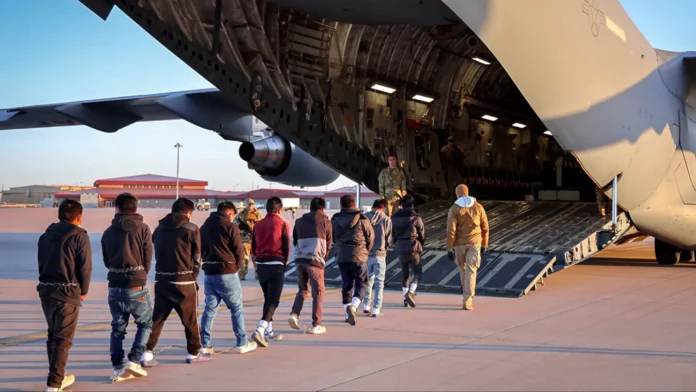
By Samuel A. Lopez, USA Herald
I’ve covered countless political and legal showdowns in my career, but today’s dramatic turn in U.S.-Mexico relations leaves me unsettled. Today news broke that the Mexican government flatly refused to allow U.S. deportation flights—carrying some of the most violent offenders—into their airspace. This development comes amid President Donald J. Trump’s unyielding crackdown on illegal immigration and his administration’s historic move to label Mexican cartels as terrorist organizations. In a single day, the fragile alliance between these North American neighbors has fractured.
Border Flashpoints
- A Deteriorating Diplomatic Bond
Mexico’s outright refusal to accept its own deported citizens, many of whom pose serious threats to public safety, underscores a chilling new chapter in cross-border relations. What does it say about Mexican President Claudia Sheinbaum’s leadership and her alleged ties to influential cartels? - Chain Reaction in Legal, Business, and Insurance Sectors
Law firms are bracing for a flurry of deportation appeals and contract disputes, corporate America anticipates supply chain disruption, and insurance companies foresee skyrocketing premiums due to escalating geopolitical risks. - Air Travel Chaos Looms
The Trump administration has signaled swift retribution, warning it may ban Mexican flights to and from the United States. Meanwhile, rumors swirl that Mexico plans an equally damaging shutdown of U.S. flights, a move that could cripple tourism and commerce on both sides of the border.
Just this morning, White House Press Secretary Karoline Leavitt announced that 538 individuals suspected of severe crimes, including gang-related activities and sexual offenses, were arrested nationwide as part of President Trump’s “mass deportation operation.” According to a senior administration official, the individuals in question hail from countries across Latin America, but an alarming portion are believed to be from Mexico. Some even allegedly maintain ties to notorious cartels the Trump administration has labeled as “enemies of the state.”
When the U.S. government arranged the deportation flights, they offered to transport offenders into the interior of Mexico—a gesture by the administration seen as “humane and generous,” ensuring deportees could reunite with family rather than being left at the border. This morning, however, we learned the Mexican government outright refused to grant landing permission to military aircraft that were already airborne en route. The brazen snub came after similar flights successfully transferred deportees to Guatemala, which had accepted them without incident.
From my vantage point, this refusal is about more than mere technicalities; it’s an outright shot across the bows against the United States’ sovereignty and Trump’s immigration policies. Rumors abound that cartels hold enormous sway in Mexico’s highest offices. President Claudia Sheinbaum, known for her leftist leanings, has previously insisted she’d “accept Mexican nationals repatriated home.” But today’s decision calls her sincerity into question. Could cartel influence—or fear of cartel retribution—be fueling Mexico’s defiance?
Here’s the irony: while Mexico has banned today’s U.S. military flights, the United States is uniquely positioned to make such a ban far more punitive on the Mexican side.
Many worry about the ripple effects on legitimate Mexican immigrants traveling for family, business, or leisure. Visa renewals and green card applications could be scrutinized more severely, leaving many immigrants—documented and otherwise—in a precarious position. Even for those with proper documentation, crossing the U.S.-Mexico border may become an ordeal of exhaustive background checks, longer wait times, or outright denials due to the surging diplomatic tensions.
Legal professionals nationwide are bracing for a tidal wave of immigration appeals, habeas corpus petitions, and wrongful detention lawsuits. Some immigration attorneys say they have already begun receiving calls from clients worried about travel to Mexico—whether for family visits or work-related ventures—fearing they might be barred from re-entry to the U.S. Meanwhile, corporate and commercial law experts foresee contract breaches and supply chain disruption if a flight ban or an all-out border closure materializes. With billions of dollars in cross-border commerce at stake, the potential lawsuits over non-delivery of goods or canceled business meetings could flood American and Mexican courts.
American businesses with strong ties to Mexico—particularly in the automotive, agriculture, and manufacturing sectors—are sounding the alarm. Imagine the scenario: a complete halt on direct flights from Detroit to Mexico City where factories and major car manufacturers regularly send parts and personnel. Suddenly, businesses that have heavily invested in Mexican labor and partnerships must scramble to find alternative transportation and supply routes, likely incurring massive costs and risking delays.
Small businesses are not immune. Retailers dependent on Mexican imports or frequent travel for trade shows in Guadalajara or Monterrey face crippling operational hurdles. Restaurants reliant on specialty items from Mexico could see supply lines severed overnight. The specter of a 25% tariff that Trump has threatened to impose in February further compounds the uncertainty.
Insurance companies, ever sensitive to geopolitical risks, have started reassessing premiums for any business or traveler with cross-border operations. Higher travel insurance costs for flights that may be canceled or postponed at a moment’s notice? That seems almost certain. Corporate liability and shipping insurance rates might also climb due to the heightened risk of cargo interruptions. The big question: will insurers cover force majeure claims if flights are grounded or if the border is closed due to a diplomatic standoff? We could witness an avalanche of litigation testing how far those clauses can stretch.
Where does all this leave President Sheinbaum and President Trump? The United States holds significant economic leverage over Mexico, from border controls to trade deals. Yet, Mexico’s cooperation is also vital for controlling the cartels. If Sheinbaum continues to stonewall these deportation flights, it may trigger a full-blown geopolitical crisis with global ramifications.
Diplomatic negotiations could still salvage the relationship if cooler heads prevail. Perhaps a carefully crafted bilateral agreement that addresses U.S. security concerns while providing Mexico with economic assurances and a structured timeline for deportations could ease tensions. However, given the entrenched positions, many insiders say that only the harshest economic and political pressure will compel Mexico to comply with U.S. demands.


